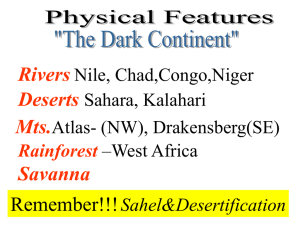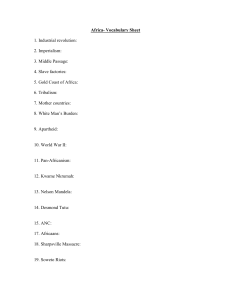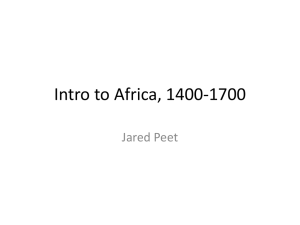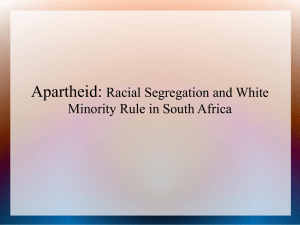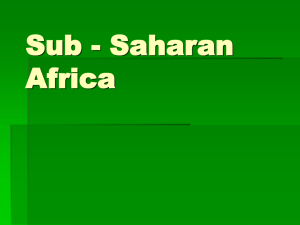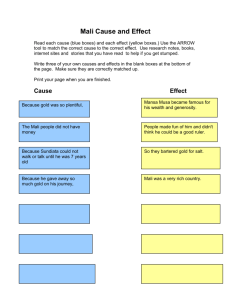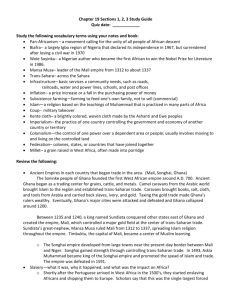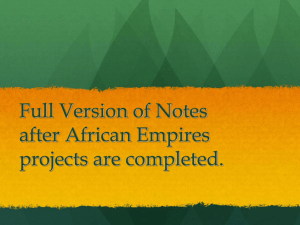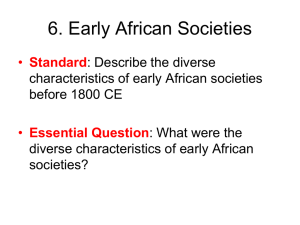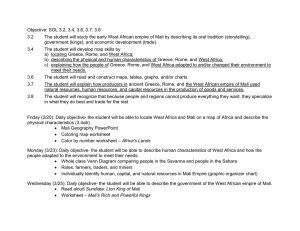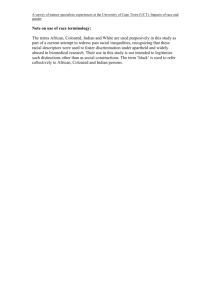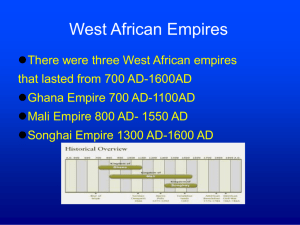Africa Review from quizlet
advertisement
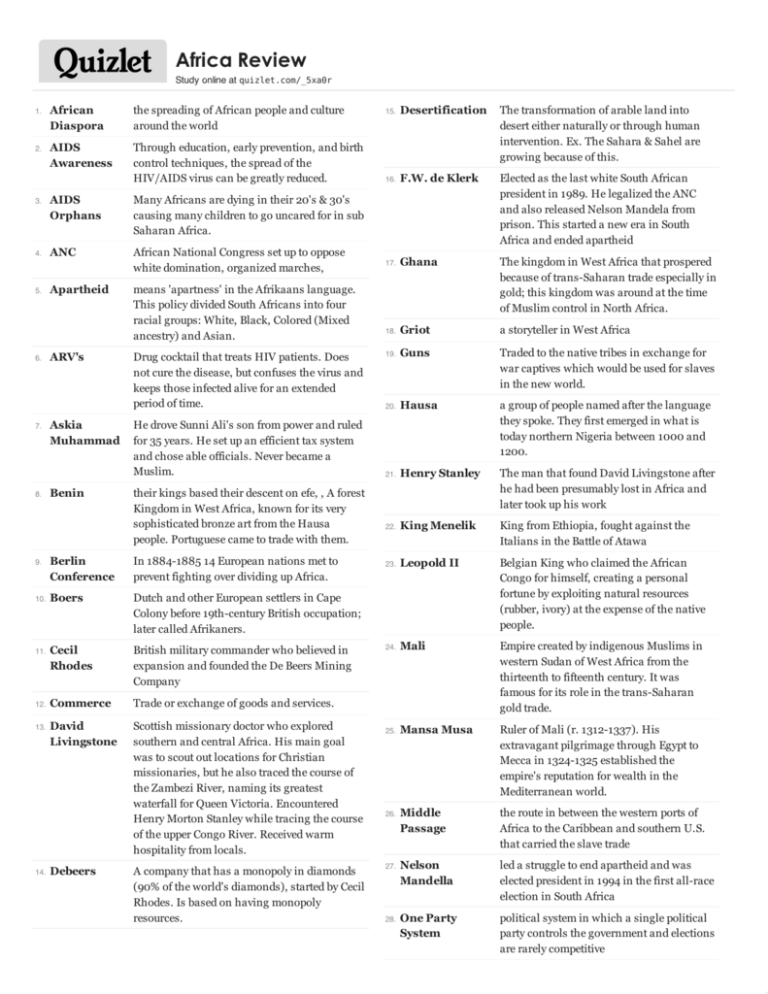
Africa Review Study online at quizlet.com/_5xa0r 1. 2. 3. 4. 5. 6. 7. 8. 9. 10. 11. 12. 13. 14. African Diaspora the spreading of African people and culture around the world AIDS Awareness Through education, early prevention, and birth control techniques, the spread of the HIV/AIDS virus can be greatly reduced. AIDS Orphans Many Africans are dying in their 20's & 30's causing many children to go uncared for in sub Saharan Africa. ANC African National Congress set up to oppose white domination, organized marches, Apartheid ARV's Askia Muhammad Benin means 'apartness' in the Afrikaans language. This policy divided South Africans into four racial groups: White, Black, Colored (Mixed ancestry) and Asian. Drug cocktail that treats HIV patients. Does not cure the disease, but confuses the virus and keeps those infected alive for an extended period of time. He drove Sunni Ali's son from power and ruled for 35 years. He set up an efficient tax system and chose able officials. Never became a Muslim. their kings based their descent on efe, , A forest Kingdom in West Africa, known for its very sophisticated bronze art from the Hausa people. Portuguese came to trade with them. Berlin Conference In 1884-1885 14 European nations met to prevent fighting over dividing up Africa. Boers Dutch and other European settlers in Cape Colony before 19th-century British occupation; later called Afrikaners. Cecil Rhodes British military commander who believed in expansion and founded the De Beers Mining Company Commerce Trade or exchange of goods and services. David Livingstone Scottish missionary doctor who explored southern and central Africa. His main goal was to scout out locations for Christian missionaries, but he also traced the course of the Zambezi River, naming its greatest waterfall for Queen Victoria. Encountered Henry Morton Stanley while tracing the course of the upper Congo River. Received warm hospitality from locals. Debeers A company that has a monopoly in diamonds (90% of the world's diamonds), started by Cecil Rhodes. Is based on having monopoly resources. 15. Desertification The transformation of arable land into desert either naturally or through human intervention. Ex. The Sahara & Sahel are growing because of this. 16. F.W. de Klerk Elected as the last white South African president in 1989. He legalized the ANC and also released Nelson Mandela from prison. This started a new era in South Africa and ended apartheid 17. Ghana The kingdom in West Africa that prospered because of trans-Saharan trade especially in gold; this kingdom was around at the time of Muslim control in North Africa. 18. Griot a storyteller in West Africa 19. Guns Traded to the native tribes in exchange for war captives which would be used for slaves in the new world. 20. Hausa a group of people named after the language they spoke. They first emerged in what is today northern Nigeria between 1000 and 1200. 21. Henry Stanley The man that found David Livingstone after he had been presumably lost in Africa and later took up his work 22. King Menelik King from Ethiopia, fought against the Italians in the Battle of Atawa 23. Leopold II Belgian King who claimed the African Congo for himself, creating a personal fortune by exploiting natural resources (rubber, ivory) at the expense of the native people. 24. Mali Empire created by indigenous Muslims in western Sudan of West Africa from the thirteenth to fifteenth century. It was famous for its role in the trans-Saharan gold trade. 25. Mansa Musa Ruler of Mali (r. 1312-1337). His extravagant pilgrimage through Egypt to Mecca in 1324-1325 established the empire's reputation for wealth in the Mediterranean world. Middle Passage the route in between the western ports of Africa to the Caribbean and southern U.S. that carried the slave trade Nelson Mandella led a struggle to end apartheid and was elected president in 1994 in the first all-race election in South Africa One Party System political system in which a single political party controls the government and elections are rarely competitive 26. 27. 28. 29. Patronage Giving loyal followers well-paying jobs or positions in the government. Some corrupt officials require bribes for Govt. contracts or licenses. 30. Plantations large farms that grow crops like coffe, rubber and cacao for export Richard Gatling American inventor of the precursor of the modern machine gun. 32. Rwanda The country where genocide took place between Hutu and Tutsi in 1994 33. Savanna a tropical or subtropical grassland containing scattered trees and drought-resistant undergrowth. 34. Shaka Zulu king of the zulus, brilliant military leader, united many small nations through war to make the Zulu empire Sharpeville Massacre In 1960, S.African police fired on ANC demonstrators killing more than 60 people. This represented a turning point in the antiapartheid movement. Social Darwinism The belief that only the fittest survive in human political and economic struggle. 37. Somalia This country is extremely poor and has no central government. There are modern day pirates here. 38. Songhai People east of Mali control gold trade moving father east. built up an army and extended their territory to the large bend in the Niger River near Gao. 39. Suez Canal Built in 1869, this linked the Mediterranean with the Red Sea, drastically shortening the trip from Europe to India. 40. Sundiata the founder of Mali empire. He crushed his enemies and won control of the gold trade routes 41. Sunni Ali His rule began in 1464 and lasted almost 30 years. He built a professional army that had a riverboat fleet of war canoes and a mobile fighting force on horseback. 42. Timbuktu Mali trading city that became a center of wealth and learning Triangular Trade A three way system of trade during 1600-1800s Africa sent slaves to America, America sent raw materials to Europe, and Europe sent guns and rum to Africa. Yoruba The Yourba were actually several peoples who lived in the same area and spoke related languages, also established a number of strong kingdoms, the most powerful were the Ide and Oyo.. 31. 35. 36. 43. 44. 45. Yoruba Art Realistic sculptures made of terra-cotta, bronze, brass, and copper.
